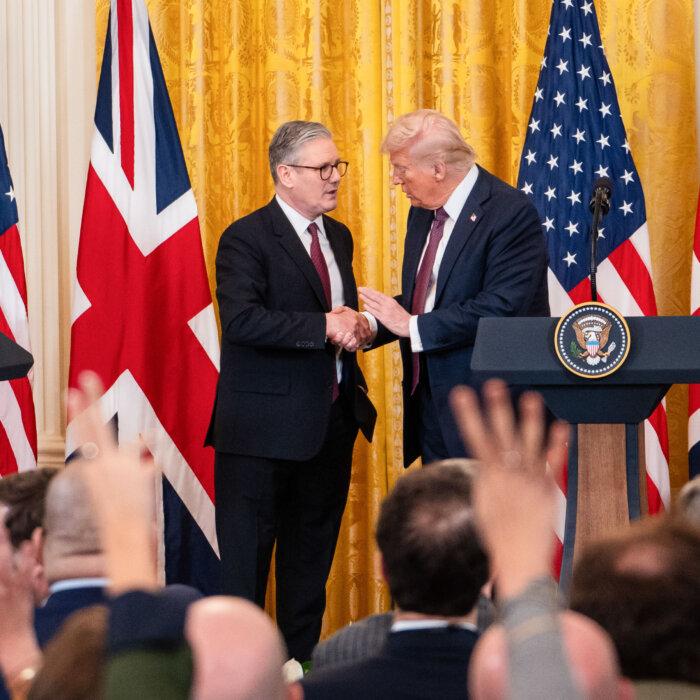For half a century, the North Sea was the heart of one of the world’s most productive energy industries, before Britain turned its back on fossil fuels in favor of renewables, but now, U.S. President Donald Trump said he would like to see drilling restart.
Trump’s message underscores industry warnings about the economic “vulnerability” of the UK, which industry participants say is created by net-zero policies.
He said the UK should “incentivize modernized drilling in the North Sea, where large amounts of oil lay waiting to be taken” and that the country’s energy costs “would go way down—and fast.”
Trump described Aberdeen, Scotland, as the “hub” of a region with “a century of drilling left,” and criticized Britain’s “old-fashioned tax system” for pushing away investors.
His comments are not out of the blue.
The UK’s political landscape has become increasingly polarized over its net-zero agenda, with debate intensifying both domestically and internationally.
Scottish First Minister John Swinney dismissed the U.S. president’s comments, saying he does not “think it’s a surprise that Donald Trump believes and says what he says about energy issues.”
However, oil executives and industry leaders say Trump is voicing a hard truth—that Britain’s current energy policy is strangling domestic production, deterring investment, and putting national security at risk.
The Labour Party, now in power, has pledged to issue no new oil, gas, or coal licenses. That position builds on the Conservative Party’s 2008 Climate Change Act, which legally commits the UK to achieving net-zero greenhouse gas emissions by 2050.
Scotland: the UK’s Energy Powerhouse
Scotland remains the UK’s energy powerhouse, producing the most oil and the second-most gas in Europe, according to NatureScot. Most of this activity occurs offshore, beyond 12 nautical miles from the coastline.Meanwhile, ongoing regulatory uncertainty and the threat of ongoing punitive taxation are deterring companies from exploring or developing new assets, even in areas with known reserves.
The North Sea firm said it was pulling out of a project to develop Pensacola, which could contain 326 million barrels of oil.
Overreliance on Imports
Francesco Mazzagatti, CEO of the oil company Viaro Energy, told The Epoch Times by email that Trump’s remarks “may be provocative,” but they highlight a “reality the UK can no longer afford to ignore: our current energy policy is undermining our own national interest.”The company has 30 fields in the North Sea.
Mazzagatti said that North Sea oil and gas are “not optional; they are essential. ”
“The UK’s overreliance on imports while actively discouraging domestic production is not a strategy; it’s a vulnerability,” he said. “If we continue down this path, we are handing over our energy security to foreign governments and exposing households and businesses to higher, less predictable costs.”
He said that the Energy Profits Levy (EPL) and ongoing fiscal instability “have pushed the UK from a leading investment destination to a cautionary tale.”
“The North Sea still holds immense potential. Ignoring it isn’t progressive, it’s reckless. The EPL must be scrapped without delay; every day it remains in place is another blow to the UK’s energy security and sovereign control over its future,” he said.
“This is not just another redundancy round,” the chamber said. “It’s a flashing red warning light for the UK’s energy security, industrial base, and transition ambitions.”
According to the chamber, more than 10,000 jobs have been lost in the sector since the EPL was introduced.
Domestic Production Allows Control Over Emissions: Industry Insider
Steve Brown, CEO of Orcadian Energy, is leading work to secure an 80-million-barrel project, one of the largest undeveloped discoveries in the North Sea, backed by private investments.“It makes no sense whatsoever to import oil or gas into the UK instead of producing it here,” Brown told The Epoch Times.
“If we produce it here, we create jobs, we improve the balance of payments, and more importantly, we have control over emissions created in producing that oil and gas,” he said.
“It’s going to get consumed anyway, and if we don’t produce it here, it'll get produced somewhere else.”
He acknowledged the government’s desire to lead on climate action but said the current approach risks collapse.
Brown said the UK is trying to show the world “how it can operate without oil and gas.”
“And the flaw with that way is that if you drive down emissions at any cost and you turn off oil and gas, then you’re setting the economy up for a car crash,” he said.
“[The] incremental cost of reducing those emissions is huge, and actually, we will show the world exactly how not to do it.”
The government is facing political difficulties in moving away from fossil fuels to green energy policies.
The Tories have also demanded a rethink of the policy.
The Epoch Times contacted the Department for Energy Security and Net Zero and the Home Office for comment on Trump’s remarks and the future of North Sea exploration, and did not receive a response by publication time.







